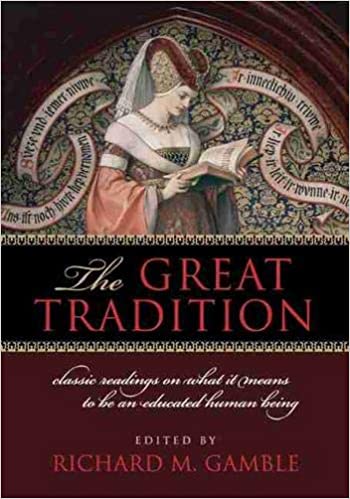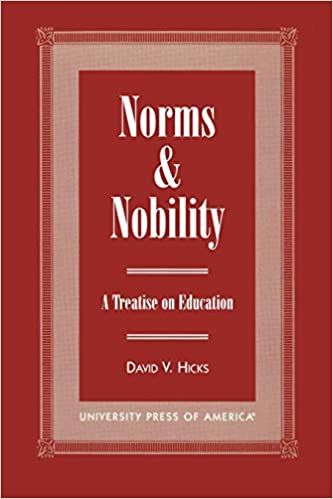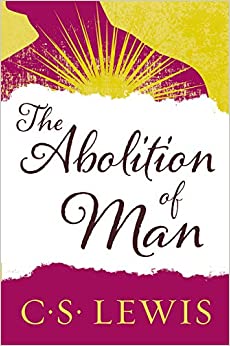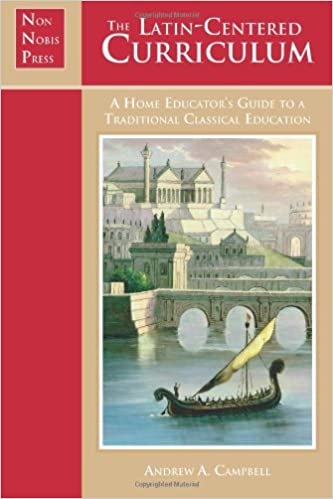The Great Tradition: Classic Readings on What It Means to Be an Educated Human Being
Frustrated with the continuing educational crisis of our time, concerned parents, teachers, and students sense that true reform requires more than innovative classroom technology, standardized tests, or skills training. An older tradition—the Great Tradition—of education in the West is waiting to be heard. Since antiquity, the Great Tradition has defined education first and foremost as the hard work of rightly ordering the human soul, helping it to love what it ought to love, and helping it to know itself and its maker. In the classical and Christian tradition, the formation of the soul in wisdom, virtue, and eloquence took precedence over all else, including instrumental training aimed at the inculcation of "useful" knowledge.
Edited by historian Richard Gamble, this anthology reconstructs a centuries-long conversation about the goals, conditions, and ultimate value of true education. Spanning more than two millennia, from the ancient Greeks to contemporary writers, it includes substantial excerpts from more than sixty seminal writings on education. Represented here are the wisdom and insight of such figures as Xenophon, Plato, Aristotle, Seneca, Cicero, Basil, Augustine, Hugh of St. Victor, Bonaventure, Thomas Aquinas, Martin Luther, John Calvin, Erasmus, Edmund Burke, John Henry Newman, Thomas Arnold, Albert Jay Nock, Dorothy Sayers, C. S. Lewis, and Eric Voegelin.
More info →Leisure: The Basis of Culture
One of the most important philosophy titles published in the twentieth century, Josef Pieper's Leisure, the Basis of Culture is more significant, even more crucial, today than it was when it first appeared more than fifty years ago. This edition also includes his work The Philosophical Act. Leisure is an attitude of the mind and a condition of the soul that fosters a capacity to perceive the reality of the world. Pieper shows that the Greeks and medieval Europeans, understood the great value and importance of leisure. He also points out that religion can be born only in leisure -- a leisure that allows time for the contemplation of the nature of God. Leisure has been, and always will be, the first foundation of any culture. Pieper maintains that our bourgeois world of total labor has vanquished leisure, and issues a startling warning: Unless we regain the art of silence and insight, the ability for non-activity, unless we substitute true leisure for our hectic amusements, we will destroy our culture -- and ourselves.
More info →The Liberal Arts Tradition: A Philosophy of Christian Classical Education (Revised Edition)
The Liberal Arts Tradition: A Philosophy of Christian Classical Education introduces readers to a paradigm for understanding a classical education that transcends the familiar 3-stage pattern of grammar, logic, and rhetoric. Instead, this book describes the liberal arts as a central part of a larger and more robust paradigm of classical education that should consist of piety, gymnastic, music, liberal arts, philosophy, and theology. The Liberal Arts Tradition also recovers the means by which classical educators developed more than just intellectual virtue (by means of the 7 liberal arts) but holistically cultivated the mind, body, will, and affections. This is a must-read for educators who want to take a second big step toward recovering the tradition of classical education.
More info →Norms and Nobility: A Treatise on Education
A reissue of a classic text, Norms and Nobility is a provocative reappraisal of classical education that offers a workable program for contemporary school reform. David Hicks contends that the classical tradition promotes a spirit of inquiry that is concerned with the development of style and conscience, which makes it an effective and meaningful form of education. Dismissing notions that classical education is elitist and irrelevant, Hicks argues that the classical tradition can meet the needs of our increasingly technological society as well as serve as a feasible model for mass education.
More info →The Abolition of Man
From Amazon: "In the classic The Abolition of Man, C.S. Lewis, the most important Christian writer of the 20th century, sets out to persuade his audience of the importance and relevance of universal values such as courage and honor in contemporary society. Both astonishing and prophetic, The Abolition of Man is one of the most debated of Lewis's extraordinary works. National Review chose it as number seven on their 100 Best Nonfiction Books of the Twentieth Century."
More info →The Latin-Centered Curriculum
From Cicero to C. S. Lewis, from Thomas Aquinas to Thomas Jefferson, the great minds of the West have been formed by a classical curriculum centered on Latin and Greek. Now you can give your children a traditional classical education at home with The Latin-Centered Curriculum. In a clear and readable introduction, The Latin Centered Curriculum surveys the history of classical education from the ancient Greeks through the 20th-century neoclassical revival. He demonstrates the central position of Latin in the traditional course of study and outlines the many benefits of placing the classical languages at the heart of the curriculum. Then he shares with you the secret of a superior education: multum non multa- not quantity, but quality. With helpful charts and detailed explanations, The Latin-Centered Curriculum guides you step by step with book and curriculum recommendations for each school subject from K-12. It shows you how focusing a few core disciplines-classical languages, mathematics, and composition-can revolutionize your home school. The best education is simple but deep.
More info →





